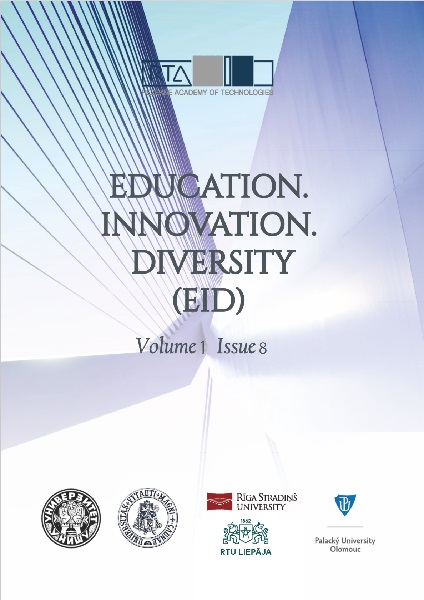MANAGING PSYCHO-EMOTIONAL RISK FACTORS AND STRESS IN THE WORK ENVIRONMENT OF SOCIAL WORKERS
DOI:
https://doi.org/10.17770/eid2024.1.7935Keywords:
psycho-emotional work environment risk factors, work environment, stress management, social workersAbstract
The publication highlights a topical and socially relevant issue in the professional reality of social workers - the dangers of psycho-emotional and psychosocial factors in the work environment and possible solutions to reduce them. The aim of the article is to identify and describe the psycho-emotional risk factors in the work environment of social workers, and to offer suggestions for reducing stress and improving job security in the practice of social work. The data for the study were obtained by analysing scientific literature and normative documents, as well as by interviewing 194 social workers from different regions of Latvia. The study identified psycho-emotional risk factors in the working environment of social workers: high professional demands, time-limited work and deadlines, increased responsibility and insufficient availability of personal protective equipment. The publication highlights recommendations, based on theory and practice, on the necessary measures to reduce stress and improve occupational safety of social workers in the provision of social services in Latvia.
References
Ābeltiņa, M. (2023). Professional burnout. Spot and prevent burnout, regain work efficiency and vitality. Riga: Zvaigzne ABC.
Bela, B., Ozola, I., Rasnača, L., Rezgale-Straidoma, E., Roga-Vailza, V., & Romāne-Meiere, A. (2023). Dictionary of social work. Riga: Academic Publishing House of the University of Latvia.
Doronina, M. (2016). The impact of life satisfaction on job satisfaction. Psychology for family and school, No. 2016/04, 30-40.
Eglīte, M. (2012). Occupational medicine. Riga: Riga Stradinš University.
European Agency for Safety and Health at Work. (2022). OSH Pulse - Occupational safety and health in post-pandemic workplaces. Flash Eurobarometer. Retrieved from: https://osha.europa.eu/sites/default/files/Eurobarometer-OSH-in-post-pandemic-workplaces_en.pdf
European Agency for Safety and Health at Work. (2024). Mental health at work after the COVID19 pandemic - what European data reveal. Retrieved from: https://osha.europa.eu/sites/default/files/documents/Mental%20health%20at%20work%20after%20the%20COVID%20pandemic_en_0.pdf
Forands, I. (2007). Assistant to the HR Officer. Riga: SIA “Elpa-2”.
Garleja, R. (2006). Human potential in social settings. Riga: RaKa.
Isham, A., Mair, S., & Jackson, T. (2021). Worker wellbeing and productivity in advanced economies: Re-examining the link. Ecological Economics, 184, Article 106989. 1-9. DOI: https://doi.org/10.1016/j.ecolecon.2021.106989
Jaunsleinis, A. (2015). The development of social work and its importance. Knowledge transfer in social work practice: you can tell by the work, 2/2015, 5. Retrieved from: https://www.lm.gov.lv/lv/media/7558/download
Labour law. (2001). Riga: Saeima. Retrieved from: https://likumi.lv/ta/id/26019-darba-likums
Labour Protection Act. (2001). Riga: Saeima. Retrieved from: https://likumi.lv/ta/id/26020-darba-aizsardzibas-likums
Latvian Association of Supervisors. (n.d.). About supervision. Retrieved from: https://www.supervizija.lv/lv/par-superviziju/
Leading research and consulting company Kantar. (2021). Three out of four employees say they are concerned about the stress associated with their day-to-day work. Retrieved from:
Ministry of Environmental Protection and Regional Development. (2021). Administrative Territorial Reform. Retrieved from: https://www.varam.gov.lv/lv/administrativi-teritoriala-reforma
Regulation No. 338 of the Cabinet of Ministers. (2017). Riga: Cabinet of Ministers. Retrieved from: https://likumi.lv/ta/id/291788-prasibas-socialo-pakalpojumu-sniedzejiem
Reņģe, V. (2007). The psychology of modern organisations. Riga: Zvaigzne ABC.
Riga Stradiņš University Institute of Occupational Safety and Environmental Health, & Stabingis, A. J. (2011). Stress at work or psycho-emotional factors of the working environment [Brochure]. Retrieved from: http://stradavesels.lv/Uploads/2014/02/18/24_2011_Psihoemoci_riski_brosura.pdf
Roja, Ž., Roja, I. & Kaļķis, H. (2016). Stress and violence at work. What to do? Riga: Gutenbergs Druka.
Vanadziņš, I., Akūlova, L., Paegle, L., Venžega, K., Lakiša, S., Jakimova, D., Kaņējeva, S., Goško, D., Libora, I., Gutoviča, O., Reinsons, J., Mūrniece, E., Pļavinska, E., Orehova, A., Liepiņa, I., Indriksone, A., & Cvetkova, J. (2023a). Final report of the study Working conditions and risks in Latvia 2019–2021. Riga Stradiņš University. DOI: https: //doi.org/10.25143/DARL-LV-2023
Vanadziņš, I., Akūlova, L., Paegle, L., Venžega, K., Lakiša, S., & Jakimova, D. (2023b). The thematic supplement Psycho-emotional factors in the working environment of the study Working conditions and risks in Latvia 2019–2021. Retrieved from: Riga Stradiņš University. DOI: https://doi.org/10.25143/DARL-LV-2023_04
Vilka, L. (2008). The role of definitions in the construction of the image of the social work profession. Social Worker, No.1, 8-11.
Downloads
Published
Issue
Section
License
Copyright (c) 2024 Education. Innovation. Diversity.

This work is licensed under a Creative Commons Attribution 4.0 International License.






